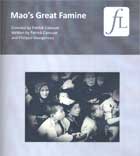
Mao’s Great Famine 2012
Distributed by Filmakers Library, 124 East 40th Street, New York, NY 10016; 202-808-4980
Produced by Caroline Roussel & Fabrice Esteve
Directed by Patrick Cabouat
DVD, color, 52 min.
College
History, Asian Studies, Political Science
Date Entered: 05/14/2013
Reviewed by Hong Cheng, Instruction Librarian, LaGuardia Community College, City University of New York, Long Island City, NYThe film crew follows a Hong Kong University graduate Zhou Xun for her research on China’s unprecedented famine in the early 1960s. Rare and valuable historical videos and images are widely used in the film in addition to survivors’ testimonies. Ms. Zhou interviewed people from various backgrounds mostly in Sichuan Province, including farmers who are survivors and a local historian whose novel was too politically sensitive to be published.
The film starts with an introduction to the historical background prior to the famine. Domestically, the then president Mao Zedong launched the national Great Leap Forward movement, which aimed to achieve total Communism within ten years. At the same time, internationally, the Chinese government kept delivering needed food to the Soviet Union in order to pay its debts before the deadline. Almost everyone in the country was forcibly involved in the movement with intensive labor work. However, the total agricultural yield was actually much less than the numbers shown in propaganda messages. The movie illustrates the miserable life people suffered while the administration of the central government chose to neglect the problem. Numerous manuscripts and literature have displayed the real life of those horrible four years, but the audience will still be wowed by some first-hand testimony viewed for the first time.
The quality of the cinematography and sound is acceptable but less than artistic perhaps due to the low budget. It would be easier for the audience to understand if the voice-over included subtitles, as well as being helpful for students who are new to the history of modern China.
The three-year famine is one of the major human tragedies during the reign of Mao. This film not only provides a real historical picture, it also brings a wider lens to the period of time until 1976, the end of the Cultural Revolution. The film is recommended to be used as a supplemental teaching material for college history and political science classes.